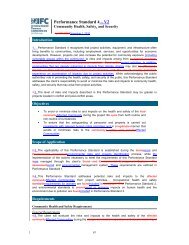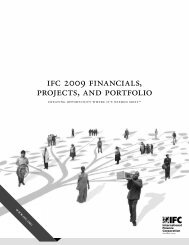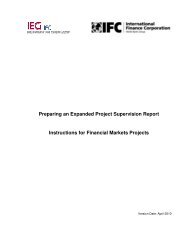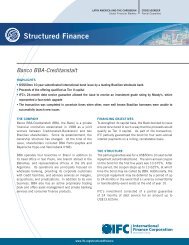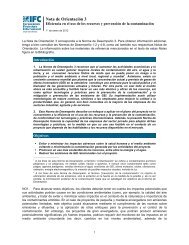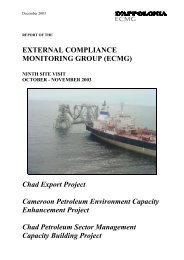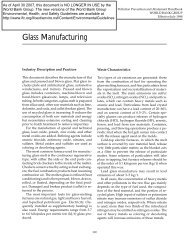Corporate Governance for Banks in Southeast Europe: Policy - IFC
Corporate Governance for Banks in Southeast Europe: Policy - IFC
Corporate Governance for Banks in Southeast Europe: Policy - IFC
You also want an ePaper? Increase the reach of your titles
YUMPU automatically turns print PDFs into web optimized ePapers that Google loves.
I. Introduction<br />
The stability of global f<strong>in</strong>ancial markets came <strong>in</strong>to the spotlight as a result of the f<strong>in</strong>ancial crisis of 2007–2010.<br />
At the heart of the crisis were <strong>in</strong>vestments whose assets had been derived from bundled home loans.<br />
Exposure to such mortgage-backed securities, and to the credit derivatives that were used to <strong>in</strong>sure them,<br />
caused the collapse or takeover of several large f<strong>in</strong>ancial firms such as Lehman Brothers, AIG, and Merrill<br />
Lynch. 1<br />
Global f<strong>in</strong>ancial markets allowed the crisis, which orig<strong>in</strong>ated <strong>in</strong> the United States, to spread to <strong>Europe</strong> and<br />
worldwide. Initially a crisis of the f<strong>in</strong>ancial sector, the impact quickly spread. F<strong>in</strong>ancial <strong>in</strong>stitutions that were<br />
<strong>for</strong>ced to deleverage and to pay back obligations created a solvency crisis that made its impact felt <strong>in</strong> real<br />
markets and eventually caused a decrease <strong>in</strong> <strong>in</strong>ternational trade.<br />
The fundamental orig<strong>in</strong>s of the crisis have been<br />
ascribed to the follow<strong>in</strong>g: 1) hous<strong>in</strong>g and monetary<br />
policy; 2) subprime lend<strong>in</strong>g; 3) easy credit conditions;<br />
and 4) the rapid deflation of a hous<strong>in</strong>g bubble.<br />
<strong>Corporate</strong> governance practices of the firms <strong>in</strong>volved<br />
are not generally understood to be the orig<strong>in</strong>, though<br />
they do appear to have played a role. An <strong>in</strong>quiry <strong>in</strong>to<br />
the causes of the crisis <strong>in</strong> the United States took the<br />
view that corporate governance and, <strong>in</strong> particular,<br />
risk management practices at systemically important<br />
f<strong>in</strong>ancial <strong>in</strong>stitutions were factors that allowed the crisis<br />
to develop. 2 Others have argued that governance was<br />
a major cause and that its role was greater than simply<br />
lett<strong>in</strong>g a bad situation get worse. 3<br />
The Importance of <strong>Governance</strong><br />
“It is not a question of whether we need<br />
corporate governance, but how to do it<br />
and survive.”<br />
Zoran Bohacek, Croatia<br />
“Here we have a once-<strong>in</strong>-a-lifetime<br />
opportunity after the f<strong>in</strong>ancial crisis,<br />
which really stress-tested our governance<br />
systems, and we have to respond.”<br />
Peter Dey, Canada<br />
In any event, the crisis has been an opportunity to “We strongly believe that the improvement<br />
reexam<strong>in</strong>e corporate governance practices <strong>in</strong> banks of corporate governance will contribute to<br />
and other f<strong>in</strong>ancial <strong>in</strong>stitutions, to establish their role the creation of a better, stronger and more<br />
<strong>in</strong> the crisis, and to learn from past mistakes. Such an susta<strong>in</strong>able bank<strong>in</strong>g system <strong>in</strong> the region.”<br />
exam<strong>in</strong>ation is without doubt salutary. It has become<br />
Kiyoshi Nishimura, Japan<br />
a global exercise, extend<strong>in</strong>g beyond those countries<br />
directly <strong>in</strong>volved <strong>in</strong> the meltdown, to develop<strong>in</strong>g<br />
countries, emerg<strong>in</strong>g markets, and transition economies. <strong>Banks</strong> <strong>in</strong> <strong>Southeast</strong> <strong>Europe</strong>, whose governance is<br />
seen as an important aspect of their successful <strong>in</strong>tegration <strong>in</strong>to the <strong>Europe</strong>an Union and the global family of<br />
banks, have also come under scrut<strong>in</strong>y.<br />
This <strong>Policy</strong> Brief emanates from the reflections of a High Level <strong>Policy</strong> Group composed of banks and<br />
regulators from <strong>Southeast</strong> <strong>Europe</strong> (SEE) 4 and <strong>in</strong>ternational experts who met <strong>in</strong> Belgrade <strong>in</strong> December 2009<br />
and <strong>in</strong> London <strong>in</strong> June of 2011 to draw lessons from the f<strong>in</strong>ancial crisis, discuss <strong>in</strong>ternational best practice<br />
<strong>in</strong> bank governance, and develop recommendations and action plans <strong>for</strong> the different countries <strong>in</strong> the SEE<br />
1 These firms were not traditional depository banks but, rather, part of the so-called shadow bank<strong>in</strong>g system that consists of nondepository banks and<br />
f<strong>in</strong>ancial entities, which at the time of the crisis were roughly equivalent <strong>in</strong> size to the U.S. bank<strong>in</strong>g sector and which played a critical role <strong>in</strong> lend<strong>in</strong>g.<br />
2 Conclusions of the U.S. F<strong>in</strong>ancial Crisis Inquiry Commission, 2010.<br />
3 G. Kirkpatrick, “The <strong>Corporate</strong> <strong>Governance</strong> Lessons from the F<strong>in</strong>ancial Crisis,” F<strong>in</strong>ancial Market Trends 2009/1 (OECD 2009).<br />
4 Albania, Bosnia and Herzegov<strong>in</strong>a, Bulgaria, Croatia, the <strong>for</strong>mer Yugoslav Republic of Macedonia, Montenegro, Romania, and Serbia.<br />
<strong>Corporate</strong> <strong>Governance</strong> <strong>for</strong> <strong>Banks</strong> <strong>in</strong> <strong>Southeast</strong> <strong>Europe</strong> <strong>Policy</strong> Brief 5



